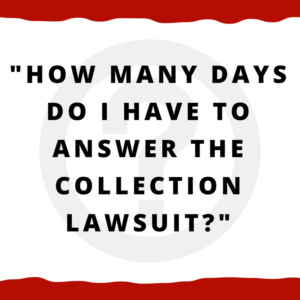How many days do I have to answer the collection lawsuit?
“How many days do I have to answer the collection lawsuit?”
 Being sued is very stressful — but nearly as stressful as dealing with a default judgment because we did not answer the lawsuit. You must not only know the time limits but you must commit to taking action.
Being sued is very stressful — but nearly as stressful as dealing with a default judgment because we did not answer the lawsuit. You must not only know the time limits but you must commit to taking action.
We’ll look at several things in this article:
- When does the clock start ticking on your time limit to answer the collection lawsuit?
- How long do you have if you were sued in Small Claims Court?
- How about if you were sued in District Court?
- What about Circuit Court — how long do you have?
- What should you do right now
As we go through this remember that “knowledge alone is NOT power” — it is only when you mix in immediate action with your knowledge that you gain power. That you can finally start down the road of being successful in your collection case.
When does the clock start ticking on your time limit to answer the collection lawsuit?
When you are served. Not when the lawsuit is filed. But when you are served — that’s when you start counting the days . . . .
How long do you have if you were sued in Small Claims Court?
You have 14 days from the date you were served.
How about if you were sued in District Court?
The same as Small Claims Court — you have 14 days from the time you were served. If the 14th day falls on a weekend or most legal holidays, you roll forward to the next business day.
What about Circuit Court — how long do you have?
This is 30 days. Circuit court is our highest court — where we have jury trials and where the amount sued for is over $6,000. (Below $6,000 is Small Claims and from $6,000 to $10,000 can also be District Court).
Do keep in mind that Circuit Court is the most complex of the courts — so factor this in as you consider what to do.
What should you do right now
You need to figure out which direction you will go. Rather than guessing or doing what someone else has done, we suggest you go through our 5 options.
First is bankruptcy which is a terrible decision for most people.
Second, you can fight the collection case on your own. You save money but you don’t have an attorney. Sometimes this is a good choice — depending on who sued you where and for how much.
Third, you can settle your case without a lawyer. You pay the collector a lump sum or a series of monthly payments. You save money by not paying a lawyer but you may overpay and you also have to consider credit reporting and taxes.
Fourth, you can hire a lawyer to fight the collection case. This means you have to spend money on a lawyer but you would certainly assume it will help you be successful or you would not be hiring a lawyer.
Finally, you can hire a lawyer to help you settle. You want to make sure that the total benefit you get from the lawyer outweighs the cost of the lawyer.
We’ll be glad to help you think through these options so you can find the best option for you.
Give us a call at 205-879-2447 or contact us through our website.
We look forward to talking with you….
PS — If you want a detailed discussion of your five options, you can read this article here.